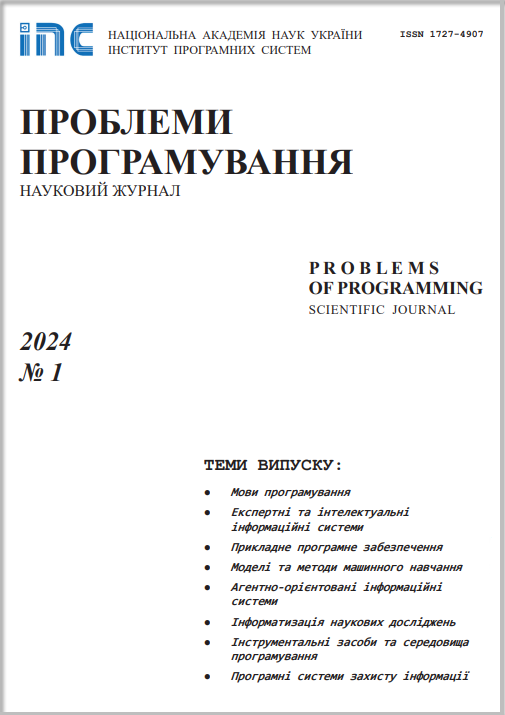Study of principles, models and methods of FAIR paradigm of scientific data management for analysis for BIG data metadata
Abstract
In this research work we considere the basic principles, models and methods of the FAIR (Findable, Accessible, Interoperable, Reusable) scientific data management paradigm as a separate case of Big Data. This paradigm is focused on the reuse of scientific research results.Basic principles of FAIR apply to three types of entities: data (or any digital object), metadata (information about this digital object) and infrastructure. Information on various projects, initiatives and communities working on solving the problems of scientific data and their metadata integration is examined.
We analyze how the properties of FAIR data contribute to the unification and integration of the scientific infrastructure in the paradigm of open science, which is based on free access to research results and open data.
Prombles in programming 2021; 4: 26-35
Keywords
Full Text:
PDF (Українська)References
Hurwitz, J., Nugent, A., Halper, F., Kaufman, M. (2013). Big Data. New York.
Rogushina J., Gladun A., Pryima S. Use of Ontologies for Metadata Records Analysis in Big Data. Selected Papers of the XVIII International Scientific and Practical Conference "Information Technologies and Security" (ITS 2018). CEUR Vol-2318. Available from: http://ceur-ws.org/Vol- 2318/paper5.pdf [Accessed 18/11/2021]
Baliakin A., Malyshev A. (2020) Management of Big Data in research infrastructures. Open systems, 03. Available from: https://www.osp. ru/os/2020/03/13055606 [Accessed 18/11/2021]
FAIR_data. Available from: https://en.wikipedia. org/wiki/FAIR_data [Accessed 18/11/2021]
Gomez-Diaz, T., Recio, T. (2021). Open comments on the Task Force SIRS report: Scholarly Infrastructures for Research Software (EOSC Executive Board, EOSCArchitecture). arXiv preprint arXiv:2108.06127.
https://doi.org/10.3897/rio.7.e63872
The FAIR Guiding Principles for scientific data management and stewardship. Available from: https://www.nature.com/articles/sdata201618 [Accessed 18/11/2021]
The FAIR data principles. Available from: https://www.force11.org/group/fairgroup/ fairprinciples [Accessed 18/11/2021]
The Irreproducibility Crisis of Modern Science - CUSES, Consequences and the Road to Reform, National Association of Scholars, (2018), Available from: https://www.nas.org/ reports/the-irreproducibility-crisis-of-modern- science [Accessed 18/11/2021]
Challenges in irreproducible research, Nature, 18-10-2018, Available from: https:// www.nature.com/collections/prbfkwmwvz/ [Accessed 18/11/2021]
Baker, 1,500 scientists lift the lid on reproducibility. Nature, 533(7604): 452-454. (2016) doi:10.1038/533452a, Available from: https://www.nature.com/articles/533452a.
https://doi.org/10.1038/533452a
Three-point FAIRification Framework https:// www.go-fair.org/how-to-go-fair/ [Accessed 18/11/2021]
Lampa, S., Willighagen, E., Kohonen, P., King, A., Vrandečić, D., Grafström, R., & Spjuth, O. (2017). RDFIO: extending Semantic MediaWiki for interoperable biomedical data management. Journal of biomedical semantics, 8(1), 1-13 [Accessed 18/11/2021]
https://doi.org/10.1186/s13326-017-0136-y
Manual:What is MediaWiki? Available from: https://www.mediawiki.org/wiki/Manual:What_ is_MediaWiki%3F [Accessed 18/11/2021]
MediaWiki. Available from: https://www.mediawiki.org/wiki/MediaWiki.
Krötzsch M., Vrandečić D., Völkel M. (2006) Semantic mediawiki. International semantic web conference, pp. 935-942. Available from: https://link. springer.com/content/pdf/10.1007/11926078_68. pdf [Accessed 18/11/2021] https://doi.org/10.1007/11926078_68
Rogushina J.V., Grishanova I.J. (2020) Ontological methods and tools for semantic extension of the media WIKI. Problems in Programming, 2-3, P.-61-73. Available from: http://pp.isofts.kiev.ua/ojs1/article/ download/398/437 [Accessed 18/11/2021].
https://doi.org/10.15407/pp2020.02-03.061
DOI: https://doi.org/10.15407/pp2021.04.026
Refbacks
- There are currently no refbacks.


